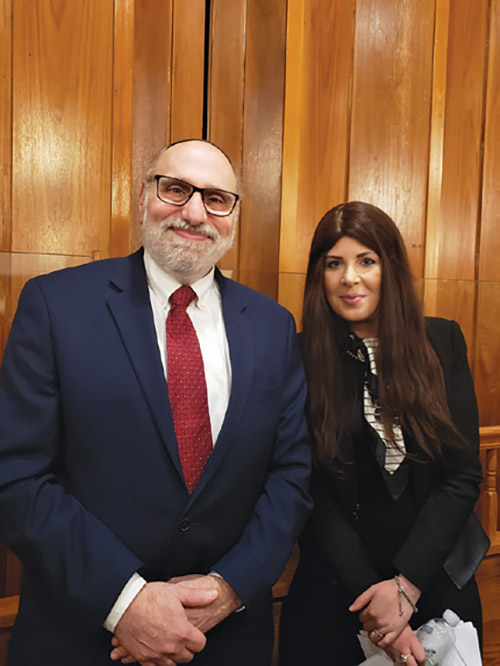

The crowd that came out to hear Avital Chizhik-Goldschmidt speak in Highland Park might have thought they already had a good sense of her background and inspirations, since she’d grown up in town. She quickly dispelled that notion by starting her talk with a moving family story from pre-World War II.
Chizhik-Goldschmidt, now the life editor at the Forward, took the audience back to 1930s Russia, describing her great-grandfather’s persecution by the Russian government for his work as a journalist, his arrest and subsequent execution for alleged treason. His example is what motivated her to choose her field, saying that while the penalties for journalists today may not be as extreme, many still face considerable governmental and/or social sanction.
The Orthodox Forum of Edison/Highland Park featured a talk by Chizhik-Goldschmidt in the final program of their 2019/2020 season, held at Congregation Etz Ahaim. Over 100 people came to learn about Chizhik-Goldschmidt’s experiences as an “Orthodox feminist” writer and her perspectives on many current news topics.
As a child, Chizhik-Goldschmidt was always reading and writing stories. Her love of the printed word was hereditary, with her family choosing books over clothes when packing to leave Russia. When her family was becoming more religiously observant, she was initially resentful of a Shabbat that required her to stop writing her stories to observe the day of rest. Today she notes that the “one day to unplug and be mentally creative” is critical to her generation of ideas for articles to write during the week.
Writing became an organic part of her life, and she also used it as a way to increase her spirituality and become closer to God. While in college, she wrote an essay about tzniut/modesty, describing the flaunting of modesty to such an extent that it becomes immodest. Dubbing it “Orthodox Compulsive Disorder,” the essay went viral. Horrified teachers at Stern College told her she would need to apologize for the essay or she would never get married. She stopped writing for a few months, but could no longer sublimate her desire to write about topics about which she was passionate.
Her personal life has provided the source for many topics she has navigated between the religious personal world and the secular workplace world. Being a strong, female Jewish feminist can be difficult in the religious dating sphere. One man she dated broke up with her and requested that she not use their relationship in a future article. When an essay she wrote appeared in print, and referenced him, he complained to the matchmaker that she should have been vetted as a possible match.
Chizhik-Goldschmidt’s favorite topics include issues about faith and feminism. An essay she wrote explored faith as a social construct and drew on the term “charedi,” literally “to tremble,” leading her to conclude that at times we tremble and are more concerned about what other people think of us than what God thinks of us. Another essay she wrote talked about the daughters of Tzelavchad and a midrash that noted that while human compassion tends to favor males over females, in the eyes of God people are equivalent and there is no preference.
Chizhik-Goldschmidt shared her view that the religious Jewish media often ignore women or do not devote much coverage to them. Citing as examples Judge Ruchie Freier and Israeli broadcaster and speaker Sivan Rahav Meir, Chizhik-Goldschmidt said that it is sad that often religious women have to build their names and reputation in the secular community first, before the religious community will consider them.
In timely references to today’s world, Chizhik-Goldschmidt’s news reports have considered the concepts of yichud in the #metoo movement, being shomer negiah in a world of corona viruses, how observant Jews are often fetishized and not realistically portrayed on television and in movies, the phenomena of families moving to Israel because they cannot afford yeshiva day school tuition, and the growing trend of taking advantage of global e-commerce to make wigs and hair coverings more affordable to Orthodox women. She also is concerned that dissension and infighting among various Jewish denominations will turn the community against itself and accomplish its demise faster than any virulent anti-Semite.
Even within controversy and conflict, there can be positive outcomes. Chizhik- Goldschmidt noted that a letter to the editor she wrote, in response to an article she found troubling, led to a job offer. And she and the suitor she wrote about in a published essay reconnected two years later at a wedding and eventually married.
By Deborah Melman
�













